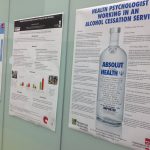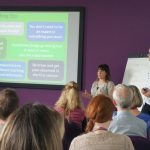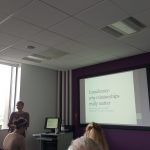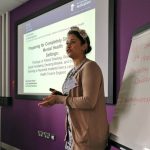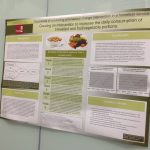We are very pleased to announce that Sarah Higgins, Technical  Skills Specialist in the Psychology Department at Staffordshire University, has won a National Award in recognition of her excellent contribution to teaching!
Skills Specialist in the Psychology Department at Staffordshire University, has won a National Award in recognition of her excellent contribution to teaching!
Sarah’s award is jointly recognised by the British Psychological Society and the Association of Technical Staff in Psychology (ATSiP), and has been announced as a joint-winner of this year’s award. Sarah has been invited to the BPS’s Annual Conference to be held in Brighton in May 2017 to receive her award.
Sarah’s award recognises her excellence in teaching, her contributions to teaching undergraduate and postgraduate students, supporting staff research projects, her advanced technical skills knowledge as well as her interactions with prospective students at Open Days where she demonstrates the state-of-the-art equipment housed in the £30 million Science Centre home to the Psychology Department. Sarah is also an active member of the Staffordshire Centre for Psychological Research, home to Staffordshire University’s psychological research, and has previously won national prizes for her own research (click here for further details).
Judy David, Academic Group Lead for Psychology and one of the team who nominated Sarah for the award, commented:
“Psychology is so proud of Sarah, and we feel very lucky indeed to have her in our Technical Team. The award is so richly deserved! Sarah works incredibly hard in teaching and supporting students and helping them learn new skills and knowledge. We are delighted this has been recognised with this prestigious award. With two award winners now in our technical team, we know our students are getting the very best experience possible!”
Dr Amy Burton, Senior Lecturer in Health Psychology who was also part of the nominating team, said:
“Sarah is an irreplaceable member of the team having progressed from being an undergraduate student to MSc level and now actively contributing to our MSc Health Psychology. Sarah has shown a fantastic commitment to our students from assisting at open afternoons, giving applicants a taste of the equipment and inspiration on how it might be used, through to one-to-one tutorials facilitating the use of complex technical equipment.
In particular, Sarah plays an essential role in the learning and development of our MSc Health Psychology students and supports them to complete high quality, well-designed and innovative research using technology and equipment at the forefront of the discipline. Sarah fully deserves this award and we are very proud and lucky to have her as part of our team.”
Many congratulations to Sarah on her fine achievement!
 The School of Psychology, Sport and Exercise at Staffordshire University is a leading School in the UK for Psychology degrees and is situated in the heart of England. We produce internationally recognized research which is driving knowledge in this area forward and we work with a variety of healthcare providers, charities, international sports teams and private sector organisations.
The School of Psychology, Sport and Exercise at Staffordshire University is a leading School in the UK for Psychology degrees and is situated in the heart of England. We produce internationally recognized research which is driving knowledge in this area forward and we work with a variety of healthcare providers, charities, international sports teams and private sector organisations.
Interested in a Psychology degree? Come to an Open Day – for further details, and to book your place at an open day, please visit: http://www.staffs.ac.uk/openyourmind/
For more information or details of the wide range of Psychology degrees on offer at Staffordshire University please visit our website and our courses page.




 centre of excellence for teaching and research in Health Psychology, and is home to Staffordshire’s BPS Accredited Stage 1
centre of excellence for teaching and research in Health Psychology, and is home to Staffordshire’s BPS Accredited Stage 1






